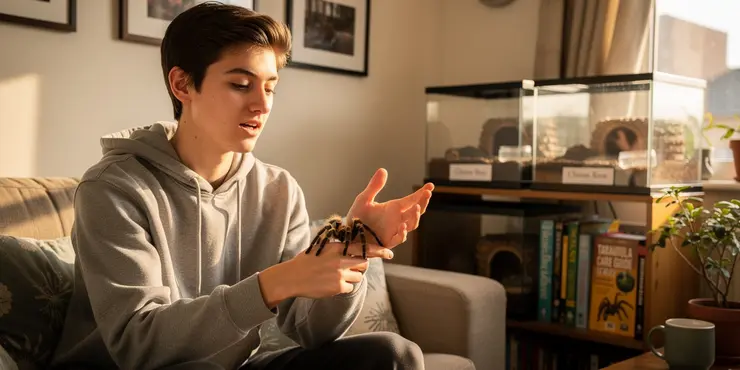
Find Help
More Items From Ergsy search
-
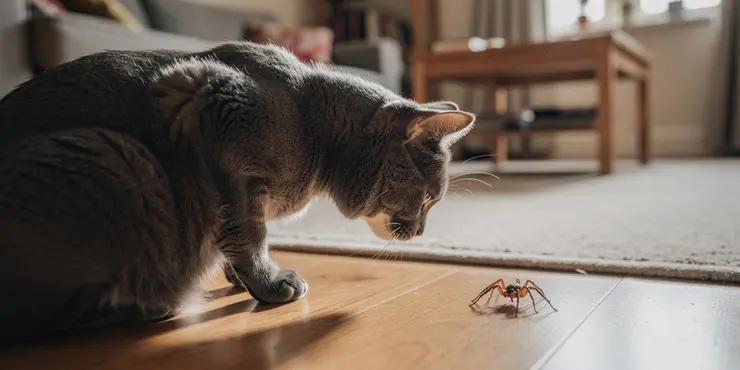
Do UK spiders pose a threat to pets?
Relevance: 100%
-
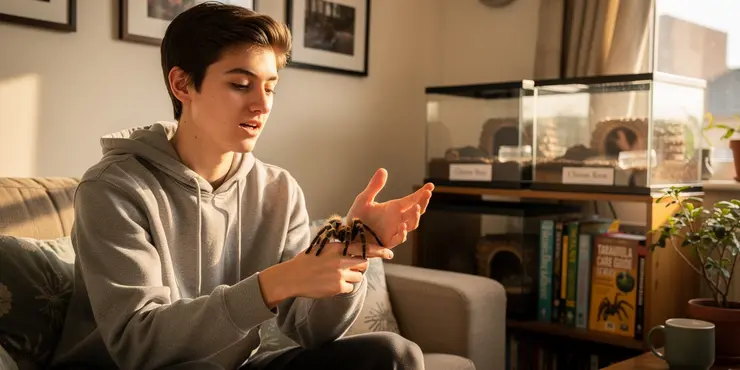
Can I keep a spider in the UK as a pet?
Relevance: 99%
-
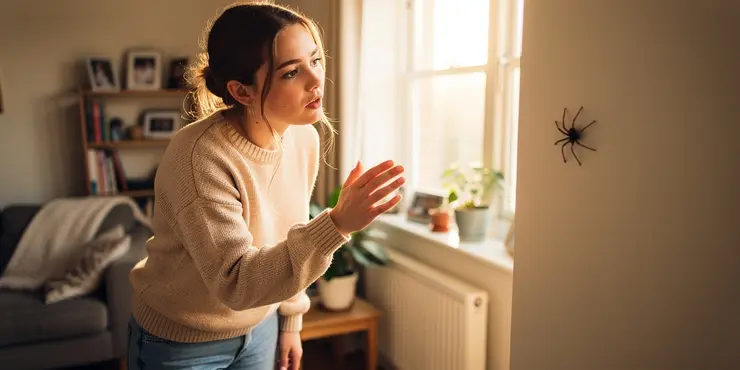
Are there any poisonous spiders in the UK?
Relevance: 65%
-
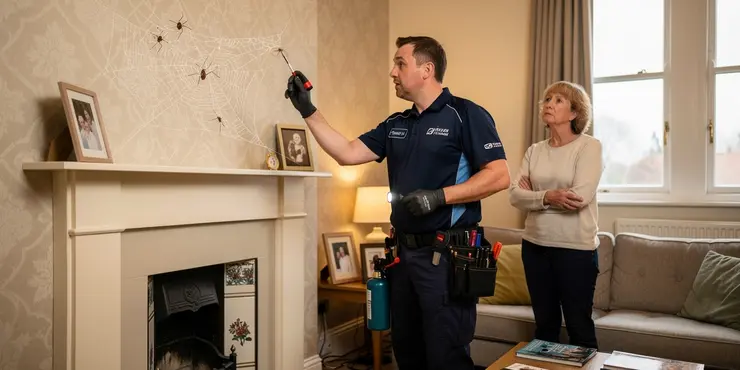
Is professional pest control needed for spiders?
Relevance: 64%
-

Are there non-venomous spiders in the UK?
Relevance: 60%
-
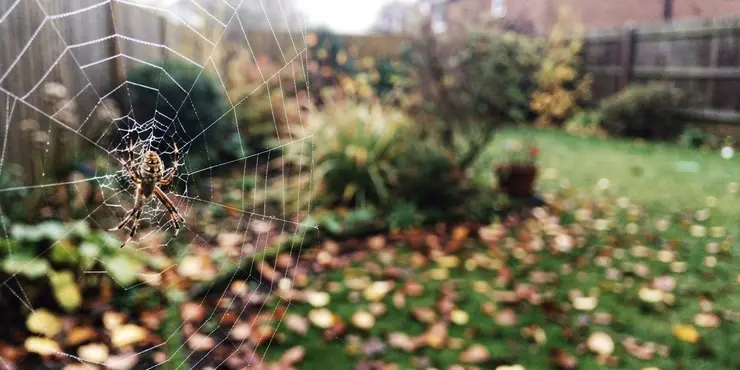
Are UK spiders venomous?
Relevance: 60%
-

How big can spiders in the UK get?
Relevance: 59%
-

What is the most dangerous spider in the UK?
Relevance: 58%
-

Which spiders in the UK can bite humans?
Relevance: 58%
-
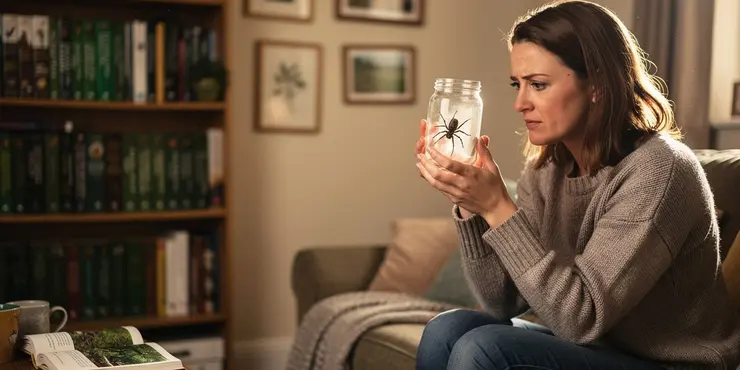
Can UK spiders cause allergic reactions?
Relevance: 58%
-

Do spiders in the UK carry diseases?
Relevance: 57%
-

Is the bite from a false widow spider dangerous?
Relevance: 56%
-

How can I identify a false widow spider?
Relevance: 56%
-
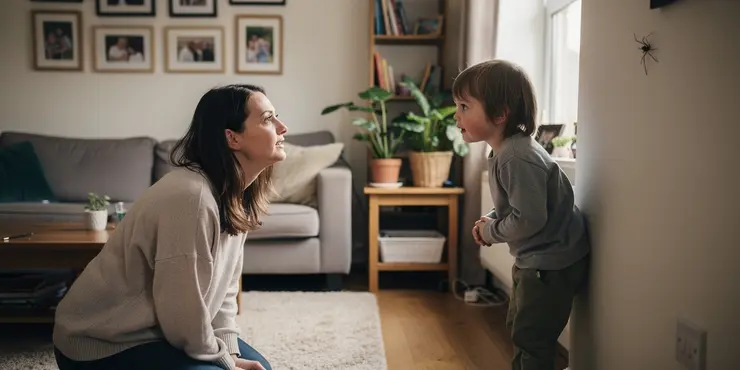
What should I do if I find a spider in my home?
Relevance: 53%
-
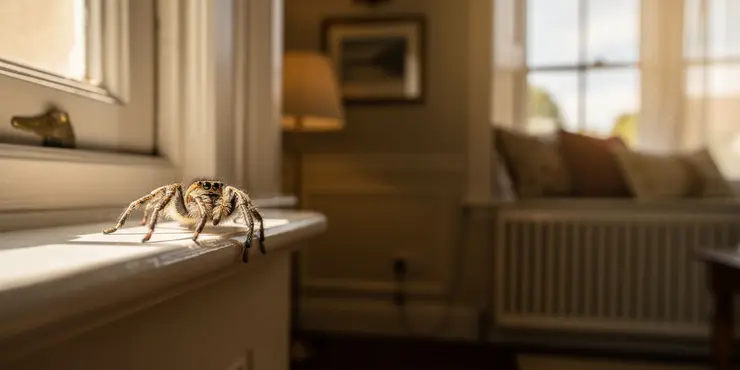
What are the benefits of having spiders in the home?
Relevance: 53%
-

What should I do if I get bitten by a spider in the UK?
Relevance: 52%
-
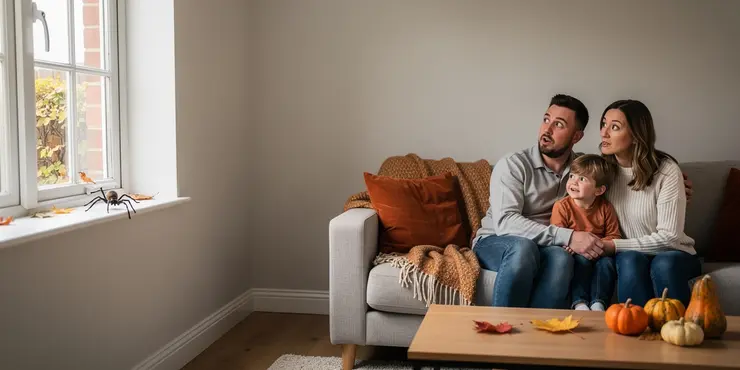
Why might there be more spiders in the home during autumn?
Relevance: 50%
-

Are there first aid courses for pets?
Relevance: 45%
-

Do pets contribute to hay fever?
Relevance: 45%
-

Can pets get Lyme disease?
Relevance: 43%
-

Can pets damage mosquito screens?
Relevance: 43%
-

The FDG PET Scan: What to expect
Relevance: 42%
-
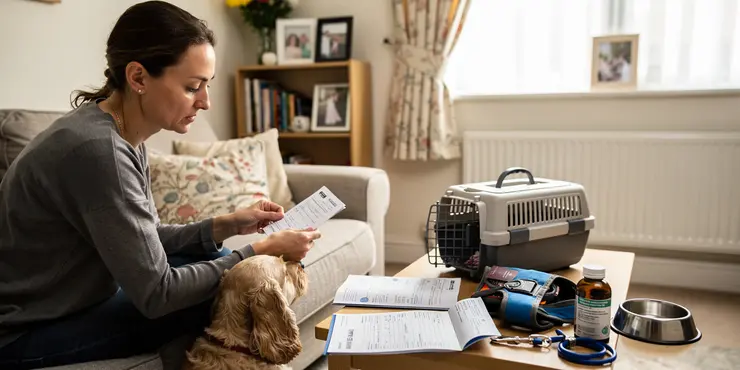
Can I bring my pet to France or Spain from the UK?
Relevance: 42%
-

Are there any special precautions for pets during a heatwave?
Relevance: 42%
-

Can pets get West Nile Virus?
Relevance: 42%
-

What changes affect pet policies in rented homes?
Relevance: 41%
-

Can pets get scabies from humans?
Relevance: 41%
-

Your PET/CT scan at University College Hospital
Relevance: 40%
-

How can I ensure pets are safe during a heatwave?
Relevance: 40%
-

How common are spider bites in the UK?
Relevance: 39%
-

Are there any precautions to take against spiders in the UK?
Relevance: 37%
-
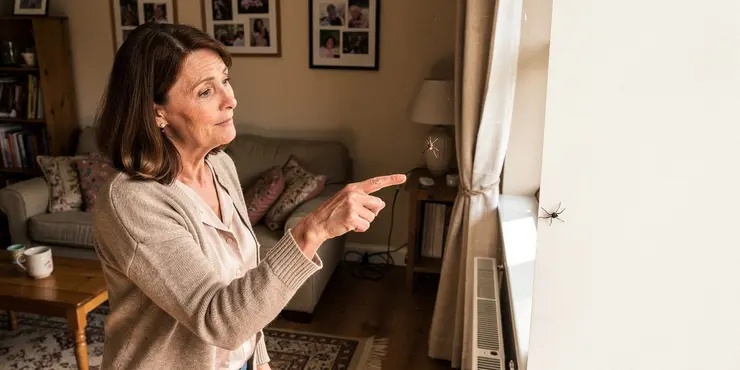
What types of spiders are commonly found in UK homes?
Relevance: 36%
-

What are potentially exempt transfers (PETs)?
Relevance: 33%
-

Can pets get scabies from humans?
Relevance: 21%
-

Can animals spread scabies to humans?
Relevance: 19%
-

Are there any native mosquito predators in the UK?
Relevance: 17%
-

Think Pharmacy: Introduction for Bites and Stings
Relevance: 16%
-

How do you prevent Lyme disease?
Relevance: 16%
-

Which types of imaging data are analyzed by AI for lung cancer detection?
Relevance: 15%
-

Can staying in a car during a heatwave be dangerous?
Relevance: 15%
Introduction
Many people in the UK consider keeping spiders as pets due to their fascinating nature and relatively low maintenance requirements. However, it is important to understand the legal, practical, and ethical aspects of keeping a spider as a pet. This guide will provide you with essential information to ensure you provide a suitable environment for your arachnid companion.
Legal Considerations
In the UK, keeping a spider as a pet is generally legal. However, certain species may be subject to specific legislation. The Dangerous Wild Animals Act 1976 regulates the ownership of certain exotic animals, including some large or venomous spider species. Before acquiring a spider, it is crucial to check if the species you are interested in requires a license. Local councils issue these licenses, and they may have additional requirements for enclosures and safety measures.
Popular Pet Spider Species
Several spider species are popular among UK pet enthusiasts. The Chilean Rose tarantula (Grammostola rosea) is a common choice due to its docile nature and ease of care. Other popular tarantulas include the Mexican Red Knee (Brachypelma smithi) and the Pinktoe tarantula (Avicularia avicularia). These species are known for their striking appearances and relatively calm temperaments, making them suitable for beginners. Research the specific needs and behaviors of different species before making a choice.
Housing and Care Requirements
Proper care and housing are essential for the wellbeing of your pet spider. Spiders are generally solitary creatures, and housing them individually is recommended. Enclosures should replicate their natural habitat as closely as possible, providing ample hiding spaces and maintaining appropriate humidity and temperature levels. Substrate, such as coconut fiber or vermiculite, should be used to line the enclosure. Additionally, ensure the enclosure is escape-proof and secure.
Feeding and Maintenance
Spiders primarily feed on live insects, such as crickets and mealworms, which should be provided according to the spider's size and dietary needs. It's important to offer a varied diet to ensure nutritional balance. Fresh water should always be available, provided in a shallow dish to prevent drowning. Regular maintenance of the enclosure is necessary, including cleaning and checking for any signs of illness or distress in the spider.
Conclusion
In conclusion, keeping a spider as a pet in the UK is feasible and can be a rewarding experience for those interested in these intriguing creatures. Ensure you research thoroughly and adhere to legal requirements and best practices for care to provide a healthy and safe environment for your spider. By understanding the responsibilities involved, you can enjoy the unique companionship of a pet spider.
Introduction
Some people in the UK like to keep spiders as pets. Spiders can be interesting and do not need much care. But you should know the rules and how to look after a spider properly. This guide will help you make a good home for your pet spider.
Legal Considerations
In the UK, you can keep a spider as a pet. But some types of spiders might have special rules. The law called the Dangerous Wild Animals Act talks about keeping some big or poisonous spiders. Before you get a spider, check if you need a special paper called a license. Local councils give these licenses and might have extra rules about spider homes.
Popular Pet Spider Species
There are a few types of spiders people like in the UK. The Chilean Rose tarantula is a popular choice because it is gentle and easy to care for. Other popular spiders are the Mexican Red Knee and the Pinktoe tarantula. These spiders look cool and are usually calm, so they are good for beginners. Learn about what each spider needs before choosing one to keep.
Housing and Care Requirements
It is important to care for your spider properly. Spiders like to live alone, so give them their own space. Their home should be like where they live in the wild. Give them places to hide and keep it the right humidity and temperature. Use materials like coconut fiber on the floor of the enclosure. Make sure the spider cannot escape from its home.
Feeding and Maintenance
Spiders eat live bugs like crickets and mealworms. Give your spider the right food for its size and kind. Offer different types of food for good health. Always have fresh water in a shallow dish so the spider does not drown. Clean the spider's home often and check if your spider looks sick or unhappy.
Conclusion
In summary, having a spider as a pet in the UK can be fun if you like these creatures. Make sure you know the rules and how to care for your spider. This way, you will have a happy and healthy pet. If you understand what to do, you can enjoy having a spider as a pet.
Frequently Asked Questions
Is it legal to keep a spider as a pet in the UK?
Yes, it is legal to keep a spider as a pet in the UK, but certain species may require special licenses or permits.
Do I need a license to own a pet spider in the UK?
Most common pet spider species do not require a license, but some exotic or dangerous species might.
Which spiders are commonly kept as pets in the UK?
Common pet spiders include tarantulas such as the Chilean rose, Mexican redknee, and Brazilian black tarantulas.
What type of enclosure do pet spiders require?
Pet spiders require a secure enclosure with proper ventilation, appropriate substrate, and hiding spots.
What do pet spiders eat?
Pet spiders typically eat live insects such as crickets, mealworms, and roaches.
How often should I feed my pet spider?
Feeding frequency depends on the species and age, but generally spiders are fed once a week or less.
Do pet spiders need water?
Yes, pet spiders need a shallow water dish for drinking, although some get most of their hydration from their prey.
Are spiders social creatures? Can I keep more than one spider together?
Most spider species are solitary and should be kept individually to avoid cannibalism.
How do I handle a pet spider?
Handling pet spiders is not recommended as it can be stressful for the spider and potentially dangerous for the handler, depending on the species.
What is the lifespan of a pet spider?
The lifespan varies by species, but tarantulas can live anywhere from 5 to 25 years in captivity.
Is there a risk of being bitten by a pet spider?
While there is a risk, most pet spiders are not aggressive and bites are rare if handled properly.
Can spider bites be dangerous?
Most pet spider bites are not dangerous to humans, but some species have venom that requires medical attention.
Do pet spiders need heat or special lighting?
It depends on the species, but many spiders require a specific temperature range and do not need special lighting.
How should I clean a spider's enclosure?
Regularly remove uneaten food and waste, and clean the enclosure every few months or as needed without disturbing the spider too much.
Can pet spiders escape from their enclosures?
Yes, without a secure lid or enclosure setup, spiders can escape, so it's important to ensure the habitat is secure.
What are the signs of a healthy spider?
A healthy spider generally has a complete and intact exoskeleton, is not lethargic, and displays a good feeding response.
How can I tell if my spider is about to molt?
Signs of molting include the spider becoming less active, refusing food, and its exoskeleton appearing dull.
How long does the molting process take for spiders?
Molting can take a few hours up to a day, with recovery lasting several days to weeks where the spider may not eat.
Are there any regulations on importing spiders into the UK?
Yes, there are regulations and restrictions on importing certain species of spiders into the UK to prevent invasive species and ensure ethical treatment.
Can children have spiders as pets?
While children can have spiders as pets, adult supervision is recommended due to the care involved and potential risks.
Can you have a spider as a pet in the UK?
Yes, you can have a spider as a pet in the UK. It is legal.
If you want a spider pet, here are a few things to help you:
- Check if the spider is safe to have at home.
- Make sure you know how to care for it properly.
- Use pictures or videos to learn more about your spider.
Yes, you can have a spider as a pet in the UK. But for some types of spiders, you might need a special paper or license.
Do I need permission to have a pet spider in the UK?
If you want a pet spider in the UK, you might need to ask for permission.
Ask an adult to help you check the rules. Some spiders are special, and you need to show you can take care of them.
Practice reading with a friend or ask for help from a teacher to understand better.
Most pet spiders do not need a special paper called a license. But some, which are special or might be dangerous, might need one.
What spiders do people in the UK keep as pets?
Some spiders people keep as pets are tarantulas. These are big, hairy spiders. Common kinds are the Chilean rose, the Mexican redknee, and the Brazilian black tarantulas.
What kind of home do pet spiders need?
Spiders need a safe, small home. This is called an enclosure. Here is what they need:
- Size: The home should not be too big or too small. It should be just right for the spider to move around.
- Air: Make sure there are small holes to let air in.
- Temperature: Keep the house warm. Use a lamp if needed.
- Hiding place: Give the spider a place to hide, like a small cave or a plant.
- Water: Put a small dish with water inside.
Ask an adult to help you set up the spider's home.
Pet spiders need a safe space to live. Their home should have air holes, good stuff to crawl on, and places to hide.
What do pet spiders eat?
Spiders that people keep as pets like to eat bugs. They eat things like crickets, flies, and little moths.
If you have a pet spider, you can feed it insects. Be careful that the bugs are not too big for your spider.
Ask an adult for help if you are not sure.
You can also use pictures and videos to learn more about feeding spiders.
Pet spiders eat bugs that are alive. They like crickets, mealworms, and roaches.
Tip: You can use pictures or videos to help understand what spiders eat.
How often do I need to feed my pet spider?
Feed your pet spider 1 or 2 times each week.
If your spider is very small, it might eat less.
Look at your spider. If it looks too fat, feed it less. If it looks too skinny, feed it more.
Ask an adult for help if you are not sure.
How often you feed a spider depends on what type it is and how old it is. Most of the time, you only need to feed a spider once a week or even less.
Do pet spiders need water?
Yes, pet spiders need water. Like all living things, spiders must drink.
Ways to give water to your spider:
- Put a small water dish in their home.
- Use a mist spray to keep things damp.
Make sure to change the water often and keep it clean.
Yes, pet spiders need a small water bowl to drink from. Some spiders get most of their water from the bugs they eat.
Do spiders like to be with other spiders? Can I have more than one spider in the same home?
Most spiders like to be alone. It's best to keep them by themselves so they don't eat each other.
How can I hold a pet spider?
Holding a spider can be tricky. Here are some tips:
1. Be gentle: Spiders are delicate. Use soft hands.
2. Stay calm: Move slowly. Do not scare the spider.
3. Use a small box: Let the spider walk into a small box. This is safer.
4. Ask for help: If you are scared, ask an adult to help you.
Remember, spiders do not like being handled too much. Let them be in their home.
It is not a good idea to hold pet spiders. This can make the spider scared and it might be unsafe for you.
You can use a soft brush or a spoon to move the spider gently if you need to.
How long does a pet spider live?
Tarantulas are big spiders. They can live for a long time. In zoos or at home, tarantulas can live from 5 years to 25 years.
Can a pet spider bite me?
Most pet spiders are not mean. If you hold them carefully, they do not bite often. There is a little risk, but it is not a big worry.
Are spider bites dangerous?
Sometimes, spiders can bite. Most bites are not serious. But a few might be dangerous. If a spider bites you and you feel sick, ask an adult to help you go to a doctor.
Here are some tips to stay safe:
- Try not to touch spiders.
- Wear shoes if playing outside.
- Ask an adult to check your bed for spiders if you are worried.
If you find it hard to read this on your own, ask someone to read it with you or use an app that reads text out loud.
Most pet spiders don't hurt people. But some kinds of spiders can bite and make you sick. You should see a doctor if this happens.
Do pet spiders need heat or special lights?
Do you have a pet spider? You might wonder if they need heat or special lights. Let's find out!
Keep Your Spider Safe and Happy
- Most pet spiders don’t need extra heat. Keep their home at room temperature.
- Normal room lights are usually fine for spiders. They don't need special lights.
- Make sure your spider has a safe home. Clean it and give them water to drink.
If you need help or are unsure, ask an adult or a pet shop worker for more information.
Different kinds of spiders like different temperatures. Most spiders do not need special lights.
How do I clean a spider's home?
Follow these steps to clean your spider's home.
- Take the spider out of its home. You can use a small box.
- Wear gloves to keep your hands safe.
- Gently remove any old food or dirt.
- Wipe the glass with a clean cloth.
- Put in fresh bedding or sand.
- Place the spider back in its home.
Ask a friend or adult for help if you need it.
Take out any food your spider doesn't eat and clean up any mess. Clean the spider's home every few months or when it needs it. Be gentle so you don't bother the spider.
Can pet spiders get out of their tanks?
Yes, spiders can escape if there is no safe lid or cover. So, make sure their home is safe and closed well.
How can you tell if a spider is healthy?
Here are some ways to see if a spider is doing well:
- Active: The spider moves around and looks busy.
- Good Web: The spider's web is strong and well-made.
- Eating: The spider catches and eats bugs.
- Clean: The spider's body looks clean and not broken.
Tips:
Use pictures to help understand. Ask an adult if you need help.
A healthy spider has all its body parts and a strong outer shell. It moves around and eats its food well.
How do I know if my spider is about to change its skin?
Spiders sometimes change their skin. This is called molting. Here are some signs you can look for:
- Not Eating: Your spider might stop eating before it molts.
- Hiding More: It might hide away in its web a lot.
- Color Changes: Your spider's color might look dull or different.
- Web Changes: It might make a thicker or different web.
If you think your spider might molt soon, you can help by:
- Making sure the place it lives is safe and quiet.
- Keeping its home clean and comfy.
- Giving it a bit more water if needed.
Understanding your spider’s habits can be a helpful way to know when it might molt.
When a spider is getting ready to shed its skin, you might notice a few things:
- The spider is not moving around much.
- It doesn't want to eat.
- Its outer skin looks dull and not shiny.
Supportive tools like magnifying glasses can help you see these changes better. Keeping a calendar can help track the spider's behavior over time.
How long does it take for a spider to change its skin?
Spiders change their skin to grow. This is called molting. It can take a few hours to a day.
During this time, a spider might hide or stay still. It will wait until its new skin gets hard.
If you want to learn more, you can ask an adult or use a picture book.
When a spider molts, it takes off its old skin. This can take a few hours or up to a whole day. After that, the spider needs to rest and get better. This can take a few days or even a few weeks. During this time, the spider might not eat.
It can help to use tools like picture books or videos to learn more about spiders and molting.
Can you bring spiders into the UK?
There are rules about bringing spiders into the UK. Here is what you need to know:
- Check the rules for your spider. Some spiders might be okay, but others are not.
- You might need a special paper, called a permit, to bring your spider.
- Ask someone who knows the rules to help you. They can make sure you do the right thing.
If you get confused, you can:
- Use pictures or videos to learn more.
- Ask a friend or family member to explain.
- Look for simple guides online.
Yes, there are rules about bringing some kinds of spiders into the UK. This is to stop harmful species from coming in and to make sure spiders are treated well.
Can kids have spiders as pets?
Yes, kids can have spiders as pets.
Spiders don't need a lot of room and are quiet.
Before having a spider, tell an adult. They can help you take care of it.
A good way to learn about spiders is by using books or watching videos.
Kids can have spiders as pets, but adults should help because taking care of spiders can be tricky and sometimes risky.
Useful Links
This website offers general information and is not a substitute for professional advice.
Always seek guidance from qualified professionals.
If you have any medical concerns or need urgent help, contact a healthcare professional or emergency services immediately.
Some of this content was generated with AI assistance. We’ve done our best to keep it accurate, helpful, and human-friendly.
- Ergsy carfully checks the information in the videos we provide here.
- Videos shown by Youtube after a video has completed, have NOT been reviewed by ERGSY.
- To view, click the arrow in centre of video.
- Most of the videos you find here will have subtitles and/or closed captions available.
- You may need to turn these on, and choose your preferred language.
- Go to the video you'd like to watch.
- If closed captions (CC) are available, settings will be visible on the bottom right of the video player.
- To turn on Captions, click settings .
- To turn off Captions, click settings again.
More Items From Ergsy search
-

Do UK spiders pose a threat to pets?
Relevance: 100%
-

Can I keep a spider in the UK as a pet?
Relevance: 99%
-

Are there any poisonous spiders in the UK?
Relevance: 65%
-

Is professional pest control needed for spiders?
Relevance: 64%
-

Are there non-venomous spiders in the UK?
Relevance: 60%
-

Are UK spiders venomous?
Relevance: 60%
-

How big can spiders in the UK get?
Relevance: 59%
-

What is the most dangerous spider in the UK?
Relevance: 58%
-

Which spiders in the UK can bite humans?
Relevance: 58%
-

Can UK spiders cause allergic reactions?
Relevance: 58%
-

Do spiders in the UK carry diseases?
Relevance: 57%
-

Is the bite from a false widow spider dangerous?
Relevance: 56%
-

How can I identify a false widow spider?
Relevance: 56%
-

What should I do if I find a spider in my home?
Relevance: 53%
-

What are the benefits of having spiders in the home?
Relevance: 53%
-

What should I do if I get bitten by a spider in the UK?
Relevance: 52%
-

Why might there be more spiders in the home during autumn?
Relevance: 50%
-

Are there first aid courses for pets?
Relevance: 45%
-

Do pets contribute to hay fever?
Relevance: 45%
-

Can pets get Lyme disease?
Relevance: 43%
-

Can pets damage mosquito screens?
Relevance: 43%
-

The FDG PET Scan: What to expect
Relevance: 42%
-

Can I bring my pet to France or Spain from the UK?
Relevance: 42%
-

Are there any special precautions for pets during a heatwave?
Relevance: 42%
-

Can pets get West Nile Virus?
Relevance: 42%
-

What changes affect pet policies in rented homes?
Relevance: 41%
-

Can pets get scabies from humans?
Relevance: 41%
-

Your PET/CT scan at University College Hospital
Relevance: 40%
-

How can I ensure pets are safe during a heatwave?
Relevance: 40%
-

How common are spider bites in the UK?
Relevance: 39%
-

Are there any precautions to take against spiders in the UK?
Relevance: 37%
-

What types of spiders are commonly found in UK homes?
Relevance: 36%
-

What are potentially exempt transfers (PETs)?
Relevance: 33%
-

Can pets get scabies from humans?
Relevance: 21%
-

Can animals spread scabies to humans?
Relevance: 19%
-

Are there any native mosquito predators in the UK?
Relevance: 17%
-

Think Pharmacy: Introduction for Bites and Stings
Relevance: 16%
-

How do you prevent Lyme disease?
Relevance: 16%
-

Which types of imaging data are analyzed by AI for lung cancer detection?
Relevance: 15%
-

Can staying in a car during a heatwave be dangerous?
Relevance: 15%


